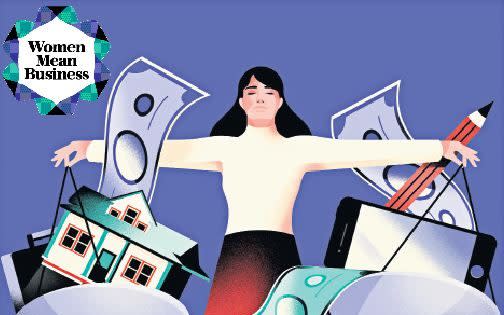Over £1bn has just been pledged for women to start their own businesses - let's get going!
- Oops!Something went wrong.Please try again later.

Three years ago, on International Women’s Day 2018, The Telegraph launched its landmark Women Mean Business campaign, which shone a light on the difficulties faced by female entrepreneurs. The campaign honed in on the shocking funding gap: around a third of UK businesses are owned by women, but female-led start-ups receive only nine per cent of venture capital funding. This limits the potential scope of these businesses, and stops women achieving their potential.
Within 24 hours after the campaign launch, the Treasury addresed the issue, calling it “incredibly important” and launching a review. Alison Rose, the now-CEO of Natwest, was tasked with writing an independent report which delivered its findings a year later, in the eponymous Rose Review.
The results were damning: on average, women have to start businesses with only half as much capital as men. Only 13 per cent of senior people on British investment teams are female, and nearly half do not have a single woman at all. Less than one per cent of British venture funding goes to all-female teams.
The report also found worrying levels of perceived bias within the venture capital community in the UK: female entrepreneurs often felt that they were seen as less competent than their male peers.
“With only one per cent of venture capital going to female-led businesses, there is an obvious role to play in highlighting to all suppliers of finance just how massive the opportunity that these female entrepreneurs represent is”, Alison Rose tells The Telegraph.
And this was all before Covid.
Women-led businesses have seemingly fared worse during coronavirus than male-led firms, according to new research by NatWest and YouGov, and published this week in a "Progress Report" continuing the Women Mean Business story.
It reveals that nearly three-quarters of female business owners have found managing their business stressful over the pandemic, compared with just over half of male counterparts. Female entrepreneurs are also 17 per cent more likely to be struggling with balancing work and family at the moment.
This might not come as a surprise to anyone who has read reports about the pandemic having turned the clock back for women - the subject of The Telegraph's Equality Check series. According to our exclusive new research, published on International Women's Day 2021, working mothers have been left burnt out, exhausted and worried about their career prospects. Women also make up nearly three-quarters of the redundancies expected worldwide from the pandemic.
But there have been some real signs of progress in the three years since The Telegraph first began Women Mean Business. The Government has launched a £50 million fund to help diverse and high-performing businesses, and NatWest has also announced a huge additional £1 billion of funding to help businesses run by women recover from Covid-19.

Nearly 80 banks and investment firms have signed up to the Investing in Women Code, which came out of the Rose Review and asks financial institutions to track the amount of funding they give female entrepreneurs, as well as making resources, tools (and money) more accessible to women starting businesses. Both NatWest and Santander offer free mentoring schemes to help women grow their businesses.
This is even more important than ever, as there are signs that more women are being driven to start businesses because of the pandemic. A survey by all-female private members’ club the Allbright found that one in four of its members are setting up enterprises as a result of Covid, with many women having lost their jobs in sectors such as retail and hospitality.
Women-led enterprises could even help us get out of the mess caused by the pandemic, Alison Rose told The Telegraph, arguing that this will help all of us: “The role they will play in the UK’s economic recovery cannot be underestimated.”
“Through continued collaboration and working in partnership across the industry, we really can all play our part in supporting our country’s female entrepreneurs to grow, scale and thrive”, says Rose. “This is very much a team game, not a competitive sport.”

